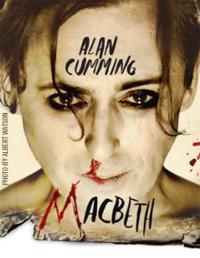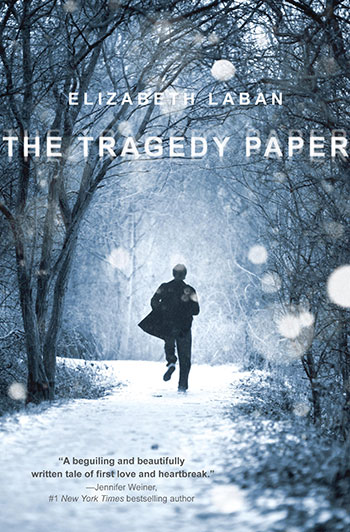
A Scottish actor performing in the "Scottish play" caught my attention. Alan Cumming doing a one-man, tour-de-force of Shakespeare's great tragedy, Macbeth, at Broadway's Ethel Barrymore Theatre (April 7) was even more intriguing. The Bard's Macbeth is a once-courageous general who's brought down by tragic flaws in his personality -- some say his ambition, others say his naiveté and lack of self-control.

In his Macbeth, Tony award-winning Cumming doesn't play a great Scottish lord, but a regular person beset by psychiatric problems. This play is set in a mental ward, where his ongoing acting out of Macbeth "is part of his therapy." Cumming's incredibly physical portrayal is a manic journey into the world of mental illness and the despair of human hollowness. Right: photo by Albert Watson
In both scenarios, we can relate to the characters, underscoring that wise axiom, "There but for the grace of God, go I." Vulnerability, unevenness of character, and personality flaws can create conflict which makes for great drama. Alan Ball, the creator of Emmy- and Golden Globe- winning True Blood which premieres Season 6 in June on HBO, suggests: "The thing with relationships on True Blood -- once they happen then you have to throw a monkey-wrench into them, because to have people be happy is not that exciting."
Happiness, unfortunately, doesn't quite cut it when it comes to drama.
From Oedipus and Macbeth in classical literature to Anakin Skywalker/Darth Vader and the often morally ambiguous comic book superheroes in modern entertainment, fiction is full of flawed heroes -- and we're beguiled by them.
But that's also increasingly true in real life. When former Oscar winner Mel Gibson appeared with Golden Globe honoree Jodie Foster, he looked scrubbed clean and sober -- miles away from the manic depressive drunk who'd shown us sloppy feet of clay as we watched once heroic "Braveheart" fall from grace. A few days later, about 28 million viewers worldwide watched transfixed as superstar cyclist and cancer survivor hero Lance Armstrong fessed up to being a liar, drug cheat and bully. Also, let's not forget how many millions of us are obsessed by the emotional train wrecks that pass for regular people on our weekly reality shows.
Tragically flawed people rule, okay! We love 'em, can't get enough of 'em!
From a psychoanalytic perspective, L.A.-based psychotherapist Robyn E. Smith says: "People are definitely influenced by negative views about themselves -- that they're 'crazy' or 'a failure.' Because such underlying fears about oneself are painful and difficult to contend with, a person takes comfort in seeing more blatantly flawed examples of people in the news. The media perpetuates this -- creating almost a tar and feathering climate so that an audience is entertained by someone getting caught in the web of human fallibility."

Elizabeth LaBan's hauntingly evocative novel, The Tragedy Paper, not only has a teenaged character named Macbeth but also deals with how his flaw brings about misfortune:
"I think we all have flaws, nobody's perfect. When you get to know somebody or study them, you're going to find flaws. Is it going to bring us all to our downfall, not necessarily. Obviously it's more dramatic when we're reading tragedy. My characters are very much teenagers, so all of those errors in judgment, whatever, are all amplified when you're a teenager, when it's so hard to see the bigger picture."
Aristotle suggested that a tragic hero has to be a person "who is not eminently good and just, yet whose misfortune is brought about not by vice or depravity, but by some error or frailty."
And that's true of LaBan's Tim Macbeth, a regular maladjusted teen going through the trials and errors of high school. Macbeth just happens to be an albino. LaBan says her novel's inspiration was Goethe's The Sorrows of Young Werther: "The lack of self-belief plays a part in Goethe's story, as it does in my book. Most of us experience self-doubt, which connects us to these characters in tragedy. One of my Macbeth's errors is how he thinks people perceive him and just assuming he's not going to fit in. I don't think it has to be that way, but that's his self-doubt and flaw."
As this page-turner progresses, Tim Macbeth compounds his error by falsely believing he's in control of his own tiny universe. But as LaBan explains, "He thinks he's in control and taking care of everything when, in fact, he's doing the opposite. Which is often like us, when we think we're doing the right thing but may be doing the complete opposite through errors in judgment. Tim brings about his own downfall, and essentially writes his own Tragedy Paper."
'Twas ever thus! Or, as F. Scott Fitzgerald, whose The Great Gatsby returns to the big screen in May, said, "Show me a hero and I'll write you a tragedy."
Alan Cumming appears in Macbeth at the Ethel Barrymore Theatre (Previews begin April 7, 2013) -- http://www.telecharge.com/Broadway/Macbeth/Overview
Also follow Ashley Jude Collie on Facebook and Twitter: @ashleycollie
